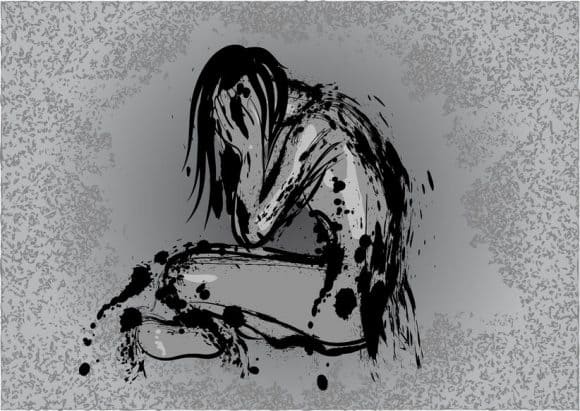Estimated reading time: 16 minutes
Major depression affects more than 16 million American adults each year (1). It can occur to anyone, at any age. And, importantly, depression is not a personal weakness but a severe medical illness.
Of course, we all have times when our mood is low. Gloom, heartache, melancholy, woe, desolation. These are all parts of life’s journey and fortunately most often normal temporary reactions to daily events. But, at what stage should such feelings be defined as clinical depression?
The British writer and poet, Giles Andreae who himself has battled depression once said: “Thinking you’ve had depression makes about as much sense as thinking you’ve been run over by a bus. Trust me – you know when you’ve got depression (2)”
Although this is not entirely true, it emphasizes the difference between clinical depression and occasional episodes of low mood. However, unfortunately, too many people don’t acknowledge their depression or think it isn’t serious or even believe that it is a personal weakness.
Only about a third (35.3%) of those suffering from severe depression seek treatment from a mental health professional (3). Hence, it is estimated that as many as two-thirds of people with depression do not realize that they have a treatable illness and do not seek treatment.
According to The American Psychiatric Association, “depression (major depressive disorder) is a common and serious medical illness that negatively affects how you feel, the way you think and how you act. Fortunately, it is also treatable. Depression causes feelings of sadness and/or a loss of interest in activities once enjoyed. It can lead to a variety of emotional and physical problems and can decrease a person’s ability to function at work and home” (4).
Hence, we might conclude that depression reflects long and persistent periods of low mood without reason? But, that’s a misinterpretation. The truth is that there is a reason. That reason is the disease we call depression.
The British actor and writer Stephen Fry has talked openly about his depression. He says: “Why should I be depressed? I’ve got enough money. I’ve got a job. People like me. There is no reason to be depressed. That’s as stupid as saying there is no reason to have asthma or there is no reason to have the measles. You know you’ve got it. It’s there. It’s not about reason.”
Depression is often considered to be a mood disorder. Fry says: “To me, mood is like the weather. Weather is real. It is absolutely real: when it rains, it rains – you get wet, there is no question about it. It is also true about weather that you can’t control it; you can’t say if I wish hard enough it won’t rain. It is equally true that if the weather is bad one day, it will get better and what I had to learn was to treat my moods like the weather.”
1. Depressive Mood
Persistent sad, anxious or “empty” mood is an essential feature of major depression.
However, frequently those who have suffered from depression describe their depressive mood in a more specific manner. It is not just about feeling sad all the time. It is somewhat different and usually much worse.
In fact, people with depression not always feel sad. They may be able to speak with their friends and have a laugh. On the outside, it may look like there’s nothing wrong. But inside, there is something missing. There is an emptiness, so hard to describe and so hard to understand unless you have experienced it yourself.
Let me quote Stephen Fry again: “There comes a time when the blankness of the future is just so extreme, it’s like such a black wall of nothingness. Not of bad things like a cave full of monsters and so, you’re afraid of entering it. It’s just nothingness, the void, emptiness and it is just horrible.”
Fry even goes further and says: “It’s like contemplating a future-less future and so you just want to step out of it. The monstrosity of being alive overwhelms you.”
Some patients with depression express intense sadness and emotional distress whereas others have a sense of emotional numbness (“blahs”). Hence, the magnitude and nature of the depressive mood may vary between patients.
2. Anxiety
Depression is often associated with anxiety. Both are facilitated by stress, either recent or dating back to childhood (5). Up to 70 percent of patients with depression experience anxiety (6).
Anxiety may be described as a feeling of worry, nervousness, or unease about something with an uncertain outcome.
Today, many experts believe that depression and anxiety are not two disorders that coexist but two faces of one disorder (7).
Often, anxiety precedes depression, sometimes by several years. Typically the onset of anxiety is in late childhood or early adolescence. Depression usually begins a few years later with typical onset in the mid-20s (8). But, of course, depression may occur at any age.
One person suffering from depression and anxiety wrote (9): I’ve always lacked self-confidence, even before my anxiety disorder was identified. I try to mingle with the best of them, but at the same time on the inside, I’m an intolerable nervous wreck and always wish I was at home watching repeats of “Friends” with a slab of fudge cake, even when I’m socializing with my nearest and dearest. Sadly, I don’t think this will ever change. So when I’m at that point where I’m trying just to leave the house, let alone do anything adventurous, my fragile mind always says “But, why? Why bother? You’re going to fail at this anyway?”
In fact, isolation may become quite severe. Simple tasks such as going to the supermarket may become a major hurdle.
3. Loss of Interest or Pleasure in Activities Once Enjoyed (Anhedonia)
The word Anhedonia describes the inability to experience pleasure from activities usually found enjoyable, e.g., exercise, hobbies, and social interactions. In Greek, anhedonia directly translates to “without pleasure.”
Most patients with depression have anhedonia. It is a crucial feature of major depression. Events and activities we used to enjoy become less interesting or fun. We may even lose interest in our friends. Libido and interest in sex often decrease as well.
Some experts suggest that anhedonia comes not from a reduced capacity to experience pleasure, but instead from an inability to sustain good feelings over time. In other words, maybe pleasure is experienced fully, but only briefly, not long enough to sustain interest or involvement in life’s good things (10).
In anhedonia, the simple and satisfying sensation of joy seems to be lacking.
Following his experience with depression, Giles Andrea wrote: “And if depression has taught me one thing, it is this: what a rare and beautiful treasure is the simple human gift of joy. For me now, joy – our capacity to delight in one another and the world – is the reason why we are here. It is as simple as that. And I feel compelled to spread the word (2).”
Anhedonia may promote social withdrawal and negative feeling towards yourself and others. Emotional abilities may be reduced, and there may be a tendency to show fake emotions. We may struggle to adjust to social situations and our interest in intimacy may diminish.
Sometimes, anhedonia is divided into social anhedonia (a general disinterest in social contact), and physical anhedonia (an inability to feel pleasure from things likes eating, touching or sex)(11).
4. Fatigue or Loss of Energy
Contrary to many other medical symptoms, fatigue is an entirely normal phenomenon in particular situations. We all become tired, but it usually gets better by rest or sleep. However, chronic fatigue as a medical symptom is typically persistent and not relieved by rest (12).
Chronic fatigue is prevalent among patients with depression. It is often described as feeling tired all the time, exhausted or listless. Some people with depression experience total lack of energy sometimes called ‘anergia’.
Fatigue and depression seem to have a circular relationship. For some, fatigue will come first; for others, depression will come first, but for most, it will probably be unclear (13). The fatigue may lower self-esteem and make the depression worse, leading to more fatigue.
If the fatigue that comes with depression becomes overpowering, basic tasks such as getting out of bed and walking may be exhausting.
The symptoms of fatigue can affect physical, cognitive, and emotional function, impair school and work performance, disturb social and family relationships, and increase healthcare utilization (14).
5. Feelings of Worthlessness or Excessive Guilt
A study of patients with major depression published 2015 showed that self-blaming emotions occurred in more than 80% of patients with self-disgust/contempt being more frequent than guilt, followed by shame (15).
The majority (85% of patients) reported feelings of inadequacy and self-blaming emotions as the most bothering symptoms compared with 10% being more distressed by negative emotions towards others.
Patients with depression often tend to misinterpret events or minor setbacks as evidence of personal failings (16).
A patient with depression has described her feelings in the following manner (17):
“I should be a spy; I am so good at leading a double life. I can put on a smile, muster up a good conversation (after ignoring a few calls and messages), but the reality is, all those “normal,” happy interactions exhaust me, and for that, I feel guilty.
I feel guilty that I want to scream at my boyfriend who is just trying to be understanding. I feel guilty that I cause those closest to me to worry. My parents, my partner, my family, and friends, all of them try to support me, to ensure I don’t get too low. How do I tell them it isn’t them and no matter what they do often I just feel low? I feel guilty that their efforts to help sometimes just make it worse.
I feel guilty for canceling plans last-minute. I mean to go, I want to go, but often I just don’t have the strength. I am brilliant at making excuses, but the shame I feel for letting people down is ever-present.
I even feel guilty for feeling guilty. Maybe some other people understand this warped way of thinking. I would tell anyone else with depression to not be so hard on themselves, to acknowledge their efforts. But to me, I just feel guilty.”
6. Sleep Disturbance (Insomnia and Hypersomnia)
Several types of sleep disorders may occur in patients with depression. The term insomnia is used often used to describe the symptoms associated with these sleep disorders.
Insomnia may be a difficulty falling asleep, waking up frequently during the night with difficulty returning to sleep, waking up too early in the morning, or merely an unrefreshing sleep. It is not defined by the number of hours slept but reflects the satisfaction with sleep. Insomnia is often associated with tiredness, lack of energy, difficulty concentrating, and irritability.
Depression may be associated with difficulty getting to sleep (initial insomnia). Waking in the middle of the night (middle insomnia) or earlier than usual (terminal insomnia) with difficulty turning to sleep is common. Prolonged nighttime sleep or daytime sleeping (hypersomnia) may occur as well.
About three-quarters of depressed patients have insomnia symptoms, and hypersomnia is present in about 40% of depressed young adults and 10% of older patients, with a preponderance of females (18).
Disturbed sleep is a very distressing symptom which has a significant impact on quality of life in depressed patients (19).
Many patients with depression wake up prematurely in the early morning hours, unable to get back to sleep. This early-morning awakening is often associated with dysphoria and depressive thoughts, and sometimes there is an agitated, even a panicky feeling. This may often get better during the day and the evenings are often more comfortable.
7. Neurocognitive Dysfunction (Difficulty Concentrating, Remembering or Making Decisions)
Neurocognitive dysfunction is common in patients with depression (20).
Memory loss and an inability to focus or concentrate may be pronounced. Working memory, fluency, and planning and problem-solving abilities may be impaired.
People with depression often feel like they can’t focus. Comprehending what you are reading may become difficult and affect the ability to store information. This may negatively impact enjoyment when reading for pleasure.
The ability to receive information or directions may be impaired. We may appear easily distracted. This may affect performance at school and work. Sometimes these symptoms may be misinterpreted as lack of interest or consideration.
In most cases, neurocognitive dysfunction in depression is readily distinguished from that caused by dementia.
8. Change in Appetite and Body Weight
Reduced appetite and weight loss are common in patients with depression. However, increased appetite and weight gain may also occur.
Changes in eating habits are often related to other symptoms of depression, such as lack of energy and interest or pleasure from activities.
While a loss of appetite is common in depression, the sadness or worthlessness experienced by many patients may be associated with overeating (emotional eating). Emotional eating is eating in response to emotional rather than physical hunger.
9. Psychomotor Disturbances (Restlessness, Irritability, Retardation)
Psychomotor disturbances that are common in depression include both agitation and retardation (16).
Psychomotor agitation is a series of unintentional, nonproductive or purposeless motions. In patients with depression, this may present as hand-wringing, pacing, and fidgeting.
Psychomotor retardation is a slowing down of thought and physical movements and may include slowing of body movements, thinking, and speech.
10. Thoughts of Suicide or Death
Depressed patients often experience recurrent thoughts of death. Suicidal ideation often occurs and there is a risk of suicidal attempt in some patients with depression (21).
Sometimes, suicidal ideation is passive. Patients often consider life not worth living and that their closest family and friends would be better off if the patient were dead.
In contrast, active suicidal ideation is marked by thoughts of wanting to die or commit suicide (16). There may be suicide plans and preparatory acts (e.g., selecting time and location, choice of method, or writing a suicide note). Such behavior indicates the patient is severely ill.
Suicidal ideation is usually preceded by hopelessness and negative expectations for the future. The patient may regard suicide as the only option to escape a never-ending and intense emotional and often physical pain
Alarmingly, many patients with suicidal ideation have not been recognized as having depression. In a large Canadian study, 48% of patients who had suicidal ideation and 24% of those who had made a suicide attempt reported not receiving care or even perceiving the need for care (22). The investigators concluded that future research should be directed toward finding better ways to identify these individuals and address barriers to their care and other factors that may interfere with their receiving help.
The annual suicide rate in the United States is approximately 13 per 100,000 individuals. Suicide is the tenth leading of cause of death. In 2014, the total number of suicide deaths in the United States was 42,773 (23). This equals 117 suicide deaths every day.
It is recognized that certain occupations and professions may be more susceptible to depression and suicide. Occupations that require frequent or difficult interactions with the public or clients, and have high levels of stress and low levels of physical activity seem to be at highest risk (24).
The medical profession has the highest risk of death by suicide of any profession or occupation. Other high control and highly regulated professions such as law enforcement, military, and the legal profession may be more likely to experience depression and suicidal behavior, and less likely to seek intervention because of the associated stigma and possible licensure implications (25).
Recent research suggests that suicide is three times more likely in individuals who have experienced a concussion, so occupations that might result in head injuries may be predisposed to suicide, with or without concomitant depression (26, 27).
A few patients with depression have described their thoughts concerning suicide on the website The Mighty (27). Here are a few examples:
“It feels like you’re all alone and no matter what’s said to you, you feel like it’s not true or doesn’t matter. It feels like you just need to end it all because you’re so tired of fighting every single day.”
“I didn’t realize what I was feeling until I came out of it. It felt like I wasn’t breathing, I was drowning, and someone was holding my head under water. I was lost, alone and there was no other way out. No one understood me and no one ever would. When I finally broke free of the deep suicidal thoughts, I was able to see them for what they were, not before or during. I felt choked by the emotions and blinded by them.”
“A constant ache in my heart, my lungs, my wrists, my legs, my mind and the pit of my stomach. The ache that tells me nothing is sacred; everything is pointless. That nothing ever has or ever will matter. Why must I continue breathing? Why must I keep getting out of bed every day when I am so incredibly tired? Feeling utterly worthless, to the point that you wonder if your own children would be better off without you around.”
“The thought of death formed as a monster in my head. It is after me; I cannot run away from it. I don’t want to die, but I don’t want to live, either. The pain is too much strong, so I desperately think I cannot take another day. But deep down inside of me, I always have a tough wish to see another day — as a human instinct, I guess. I grabbed this very little feeling to go on. I hope everyone else will [too].”

Diagnosing Depression
Symptoms of depression may include the following:
-
Persistently sad, anxious, or empty moods
-
Loss of pleasure in usual activities (anhedonia)
-
Feelings of helplessness, guilt, or worthlessness
-
Crying, hopelessness, or persistent pessimism
-
Fatigue or decreased energy
-
Loss of memory, concentration, or decision-making capability
-
Poor abstract reasoning
-
Restlessness, irritability
-
Sleep disturbances
-
Change in appetite or weight
-
Physical symptoms that defy diagnosis and do not respond to treatment – (very commonly pain and gastrointestinal complaints)
-
Thoughts of suicide, death, or suicide attempts
-
Poor self-image or self-esteem
To establish a diagnosis of major depression, a patient must express one of the first two items above and at least five of the other symptoms listed. Such disturbances must be present nearly daily for at least two weeks (25).
The Bottom-Line
Dear reader. If you have read this article, it may be for general information purposes or because you fear or believe that you may be suffering from symptoms associated with depression. If the latter is true, I want to remind you that depression is not a personal weakness but a serious medical disorder.
Because depression is a disease, it can not be “willed” or “wished away”. Unfortunately, that is a common misperception by the public and some medical professionals.
Patients with depression often feel terrible. The combination of physical and emotional symptoms may be overwhelming. The tiredness, darkness, and emptiness may seem unbearable. However, depression is a treatable disease. Almost all people who have suffered from depression will tell you that things will get better. And that is true.
And, remember; Never be ashamed of your depression. You wouldn’t be if you had a brain tumor, heart attack or leukemia.
Oh, and finally; Don’t try to deal with your depression by yourself. Seek professional help.
Discover more from Doc's Opinion
Subscribe to get the latest posts sent to your email.



Nice content , thank you for sharing. informative content.
A person may suspect depression, but the exact diagnosis can be made only by a specialist who will not only confirm the presence of the disease, but also help to cope with it. In recent years, cases of self-diagnosis of depression using, for example, Beck scale, which can easily be found on the Internet. This method can not be called effective, since this scale was developed not for self-diagnosis, but to assess the effectiveness of the therapy. One of the causes of depression may be reduced levels of hormones. And as much as you try to fight depression until you get your hormone levels back, it won’t go away. Therefore, you can go to the clinic https://bhrcenter.com/hormone-replacement-therapy/ where you will be helped to overcome the depression, but you need to understand that this is not a quick process, so you need to consult a doctor.
Almost all people who have suffered from depression (AND LIVED) will tell you that things will get better. And that is true.
There… I fixed it.
Depression will sometimes at some stage enter to us when we aren’t aware, if we can identify it initially may be we can help us to live quality life. we need to agree truly what we have and prioritize our life with it and not just postponing it with other activities. if we feel future-less-future which is the common cause of it, we need really to write about what we think if we don’t have true friends whom we can share. sometimes it happens to like everything comes to end, just take break of five minutes without thinking it, but u truly think so repeat taking breaks. its not easy to come out of depression but its worth to try once to come out of it.